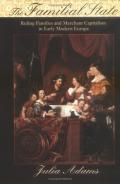
Abstract:
The seventeenth century was called the Dutch Golden Age. Over the course of eighty years, the tiny United Provinces of the Netherlands overthrew Spanish rule and became Europe’s dominant power. Eventually, though, Dutch hegemony collapsed as quickly as it had risen. In The Familial State, Julia Adams explores the role that Holland’s great families played in this dramatic history. She charts how family patriarchs—who were at the time both state-builders and merchant capitalists—shaped the first great wave of European colonialism, which in turn influenced European political development in innovative ways. On the basis of massive archival work, Adams arrives at a profoundly gendered reading of the family/power structure of the Dutch elite and their companies, in particular the VOC or Dutch East India Company. In the United Provinces, she finds the first example of the power structure that would dominate the transitional states of early modern Europe—the “familial state.” This organizational structure is typified, in her view, by “paternal political rule and multiple arrangements among the family heads.”